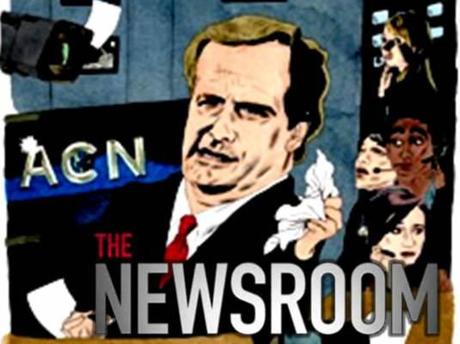
The Newsroom is a television show that seeks to portray – falsely- those in real-life mainstream media as neutral, truth-telling arbiters.
Aaron Sorkin’s new cable TV series imagines the quixotic quest for the perfect newsroom. It imagines one where bright journalists make quick decisions about what stories really mean – and present them as forcefully as possible, without trying to insert some artificial balance in stories where no parity exists.
At its worst, the show chokes on its own sanctimony, and suffers from the same flaw that it decries on real cable shows. Though the show is captivating, riveting, and rousing, it was also a condescending, smug, infuriating mixture and a potent potion that advertises itself as intelligence-enhancing but could actually just be crazy-making.
There’s no denying that Sorkin’s shows can be addictive: I couldn’t stop watching no matter how hard I tried.
Sorkin is often presented as one of the auteurs of modern television, an innovator and an original voice. But he’s more logically placed in a school of showrunners who favor patterspeak, point-counterpoint, and dialogue-driven tributes to the era of screwball romance. Some of this banter is intelligent; just as often, however, its artificial intelligence, predicated on the notion that more words equals smarter. Sorkin’s trademarked ratatat dialog plays better in either small chunks or ensemble scenes, in which every character gets to shoot off a zinger and then retreat back into the periphery.
Sorkin is supposed to be on a different level from his peers: longer words, worldlier topics. And many viewers clearly buy into this idea.
Sorkin’s shows are the type that people who never watch TV are always claiming are better than anything else on TV. The shows’ air of defiant intellectual superiority is rarely backed up by what’s inside—all those rants, fingers poked in chests, palms slammed on desks, and so on. In fact, “The Newsroom” treats the audience as though we were extremely stupid.
The Newsroom sounded more promising, journalism being a natural habitat for blowhards. But so far the series lacks the squirmy vigor particularly since Sorkin saps the drama with an odd structural choice. Rather than invent fictional crises, he’s set the show in “the recent past,” so that the plot is literally old news: the BP oil spill, the Tea Party, the Arizona immigration law. It invites the criticism that we’re given half of the news from two years ago as it should have been reported—a bit a-topical, eh? They say there’s a legitimate point to setting this two years ago. Most people will (or should) remember these news events and how they turned out. Thus, we know the news and can pat them on the back for getting it right before they would be expected to in real life.
That sounds like an innovative concept, but it turns the characters into back-seat drivers, telling us how the news should have been delivered. Naturally, the anchor slices through crises by “speaking truth to stupid”. But he also seizes credit for “breaking stories”—like the political shenanigans of the Koch brothers—that were broken by actual journalists, all of them working in print or online.
Will McAvoy (played by Jeff Daniels) is an irascible anchor whose brand is likability, and it’s a good line, delivered well.
Much of McAvoy’s diatribe during the first episode was bona-fide baloney—false nostalgia for an America that never existed—but it is exciting to watch. Your ears will prick up. The pilot of “The Newsroom” is full of yelling and self-righteousness, but it’s got energy.
It starts effectively enough, with an homage to “Network” ’s galvanizing “I’m mad as hell” rant, as McAvoy, a blandly uncontroversial cable big shot whom everyone tauntingly calls Leno, is trapped on a journalism-school panel. When the moderator needles him into answering a question about why America is the greatest country on earth, he goes volcanic, ticking off the ways in which America is no such thing, then closing with a statement of hope, about the way things used to be. This speech goes viral, and his boss, Charlie Skinner (Sam Waterston) and his producer, MacKenzie McHale (Emily Mortimer), who’s also his ex-girlfriend, encourage him to create a purer news program, purged of any obsession with ratings and buzz. They aim to remake television news: “This is a new show, and there are new rules.”
In this show, clever people take turns admiring one another. They sing arias of facts. Their outrage is so inflamed that it amounts to a form of moral eczema—only it makes the viewer itch.
The second episode is more obviously stuffed with piety and syrup, although there’s one amusing segment, when McAvoy mocks some right-wing idiots. In another scene in the second episode, the show-within-a-show’s moral visionary, McHale, is telling her news team to follow certain rules when they attempt to present both sides an issue.
- Is this information we need in the voting booth?
- Is this the best possible form of the argument?
- Is the story in historical context?
And arguably, a fourth one….
- Is there really two sides to this story?
I drool at the prospect. The second rule nixes the wackos and is actually also spelling out what Sorkin hopes to accomplish in the TV series., the fourth rule avoids the “fairness bias” that makes every dumb idea into a reasonable alternative, and the other two mean they’re important and intelligible.
She also hires a very smart and talented Sloan Sabbith (Olivia Munn), and wickedly “Sexy and hot” or, in MacKenzie’s words, doesn’t “look like George Bernard Shaw”, economist to do a 5 minute slot to simply tell the viewer what the economic state of the nation is, no bullshit.
Despite the fact that potential interviewees are dropping out and refusing to turn up, the fact remains that they created a show that rattles cages because it has begun its path to tell the truth. However, up at the top, a senior ratings advisor is threatening to persuade McAvoy away from this kind of broadcasting and to focus on what’s popular to get ratings.
After that, “The Newsroom” gets so bad so quickly that I found my jaw dropping. The third episode is lousy (and devolves into lectures that are chopped into montages). The fourth episode is the worst. In the fourth episode, the show injects a real-life tragedy into the mix, pouring a pop ballad over the montage, just the way “E.R.” used to do whenever a busload of massacred toddlers came crashing through the door. There are six more episodes to go.
The Newsroom is so naïve, it’s cynical. Sorkin’s fantasy is of a cabal of proud, disdainful brainiacs, a “media élite” who swallow accusations of arrogance and shoot them back as lava. But if the storytelling were more confident, it could take a breath and deliver drama, not just talking points. Instead, the deck stays stacked. Whenever McAvoy delivers a speech or slices up a right-winger, the ensemble beams at him, and their eyes glowing as if they were cultists. The series turns McAvoy into the “performer who the show keeps insisting is God’s gift to Broadway”. Can you blame me for rooting for McAvoy’s enemies, all those flyover morons, venal bean-counters, sorority girls, and gun-toting bimbos? Like a political party, a TV show is nothing without a loyal opposition.
The TV series may be flawed, but it is still good. Most importantly, it is a show worth dissecting and debating — one that, like its fictional counterpart “News Night,” is still developing. They both deserve a shot at greatness.
It is apparent that the show’s big theme is not about the news it is telling, but how they are telling the news. Despite the issues regarding the news coverage in “The Newsroom,” the news isn’t the star. It’s the people who work in the news business — the ones crazy enough to stick with it, the ones who feed off the news and the race to deliver it like a drug. In a time of government inquiries, media scandals and big corporations controlling the way news is told to the public, Sorkin’s message on how reform in the media should take place is very clear.
This is about the media and the people that run it, no matter if they are for print, broadcast or online social media.
I would want the moral of the show to teach us that the news should be reporting the actual, comprehensive and unbiased news rather than sensationalized or fabricated reports, just to be able to report something and earn high ratings.

